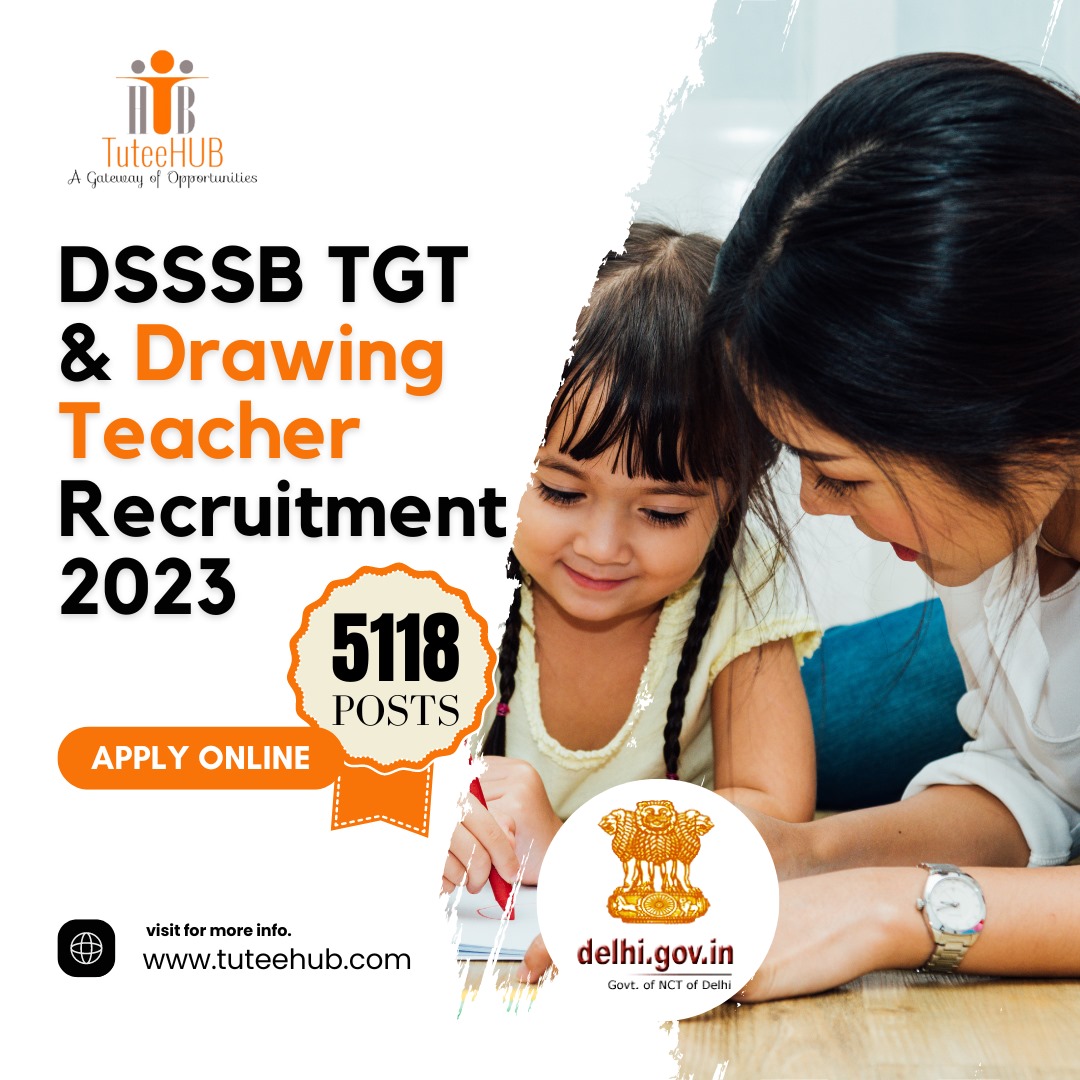Chapters
DSSSB TGT And Drawing Teacher Recruitment Tutorial

Overview
The Delhi Subordinate Services Selection Board (DSSSB) is a government agency responsible for conducting recruitment examinations for various posts within the Delhi government. One of the most sought-after examinations conducted by DSSSB is the Trained Graduate Teacher (TGT) and Drawing Teacher Recruitment Examination.
1.2 Eligibility Criteria for DSSSB TGT & Drawing Teacher Recruitment
1.2.1 TGT (Non-Medical)
- Bachelor's degree in any stream
- B.Ed degree with specialization in a non-science subject
- CTET (Central Teacher Eligibility Test) qualification
1.2.2 TGT (Science)
- Bachelor's degree in science (Physics, Chemistry, Biology, or Mathematics)
- B.Ed degree with specialization in a science subject
- CTET (Central Teacher Eligibility Test) qualification
1.2.3 Drawing Teacher
- Bachelor's degree in Fine Arts
- B.Ed degree with specialization in Art Education
- CTET (Central Teacher Eligibility Test) qualification
1.3 Exam Pattern for DSSSB TGT & Drawing Teacher Recruitment
1.3.1 Paper 1 (Objective Test)
- TGT (Non-Medical/Science): General Awareness, Reasoning, Mathematics, and English (100 questions)
- Drawing Teacher: General Awareness, Reasoning, Art and Culture, and English (100 questions)
1.3.2 Paper 2 (Descriptive Test)
- TGT (Non-Medical/Science): Answer writing in Hindi and English on topics related to teaching methodology and child psychology (120 marks)
- Drawing Teacher: Practical test based on drawing and art techniques (120 marks)
1.4 Syllabus for DSSSB TGT & Drawing Teacher Recruitment
1.4.1 Paper 1 (Objective Test)
TGT (Non-Medical/Science)
- General Awareness: Current events, history, geography, polity, and economics
- Reasoning: Analytical reasoning, logical reasoning, and data interpretation
- Mathematics: Number system, algebra, geometry, and trigonometry
- English: Grammar, vocabulary, comprehension, and usage
Drawing Teacher
- General Awareness: Current events, history, geography, polity, and economics
- Reasoning: Analytical reasoning, logical reasoning, and data interpretation
- Art and Culture: Indian art, Western art, and contemporary art
- English: Grammar, vocabulary, comprehension, and usage
1.4.2 Paper 2 (Descriptive Test)
TGT (Non-Medical/Science)
- Child psychology
- Teaching methodology
- Lesson planning
- Classroom management
- ICT in education
Drawing Teacher
- Drawing techniques
- Art Education
- Curriculum design for Art Education
- Assessment in Art Education
- ICT in Art Education
1.5 Preparation Strategy for DSSSB TGT & Drawing Teacher Recruitment
1.5.1 Paper 1 (Objective Test)
- Study the syllabus thoroughly
- Solve previous year question papers
- Take mock tests
- Focus on improving speed and accuracy
- Practice time management
1.5.2 Paper 2 (Descriptive Test)
TGT (Non-Medical/Science)
- Read books and articles on child psychology and teaching methodology
- Practice writing answers in Hindi and English
- Develop a clear and concise style of writing
- Focus on presenting well-organized and relevant content
Drawing Teacher
- Practice drawing regularly
- Study the syllabus and familiarize yourself with the various art techniques
- Develop a comprehensive understanding of Art Education
- Practice writing answers based on the syllabus
- Focus on presenting visually appealing and well-structured answers
1.6 Tips for Success in DSSSB TGT & Drawing Teacher Recruitment
- Start preparing early
- Set realistic goals
- Follow a structured study plan
- Take breaks and engage in activities to refresh your mind
- Stay positive and motivated
- Seek guidance from experienced mentors or coaching institutes
FAQs
- Q: What is the DSSSB TGT and Drawing Teacher Recruitment Examination? A: It's an exam conducted by the Delhi Subordinate Services Selection Board (DSSSB) for recruiting Trained Graduate Teachers (TGTs) and Drawing Teachers.
- Q: What are the eligibility criteria for TGT (Non-Medical)? A: Bachelor's degree, B.Ed in a non-science subject, CTET qualification.
- Q: What is the syllabus for Paper 1 (Objective Test) for TGT (Science)? A: General Awareness, Reasoning, Mathematics, and English.
- Q: What is the format of Paper 2 (Descriptive Test) for TGT (Non-Medical/Science)? A: Answer writing in Hindi and English on child psychology and teaching methodology.
- Q: How can I improve my speed and accuracy for the Objective Test? A: Solve previous year question papers and take mock tests.
- Q: What should I focus on for the Descriptive Test for Drawing Teacher? A: Presenting visually appealing and well-structured answers based on syllabus.
- Q: What is the eligibility criteria for Drawing Teacher? A: Bachelor's degree in Fine Arts, B.Ed in Art Education, CTET qualification.
- Q: What is the syllabus for Paper 1 (Objective Test) for Drawing Teacher? A: General Awareness, Reasoning, Art and Culture, and English.
- Q: Can I seek guidance from mentors or coaching institutes? A: Yes, it's a good idea to get support from experienced individuals or institutions.
- Q: What are some tips for success in the DSSSB TGT and Drawing Teacher Recruitment? A: Start preparing early, set realistic goals, stay positive, and seek guidance.
Tutorials are for educational purposes only, with no guarantees of comprehensiveness or error-free content; TuteeHUB disclaims liability for outcomes from reliance on the materials, recommending verification with official sources for critical applications.
Similar Tutorials

Advanced Excel Charts Tutorial: How to Create Prof...
Learn how to create professional charts in Excel with our advanced Excel charts tutorial. We'll show...

Advanced Excel Functions: Tips and Tricks for Boos...
Are you tired of spending hours working on Excel spreadsheets, only to find yourself stuck on a prob...

Apache Flume Tutorial: An Introduction to Log Coll...
Apache Flume is a powerful tool for collecting, aggregating, and moving large amounts of log data fr...
Explore Other Libraries
Related Searches
Please allow ads on our site
Kindly log in to use this feature. We’ll take you to the login page automatically.
Login
Join Our Community Today
Ready to take your education and career to the next level? Register today and join our growing community of learners and professionals.

Your experience on this site will be improved by allowing cookies. Read Cookie Policy
Your experience on this site will be improved by allowing cookies. Read Cookie Policy


Comments(2)